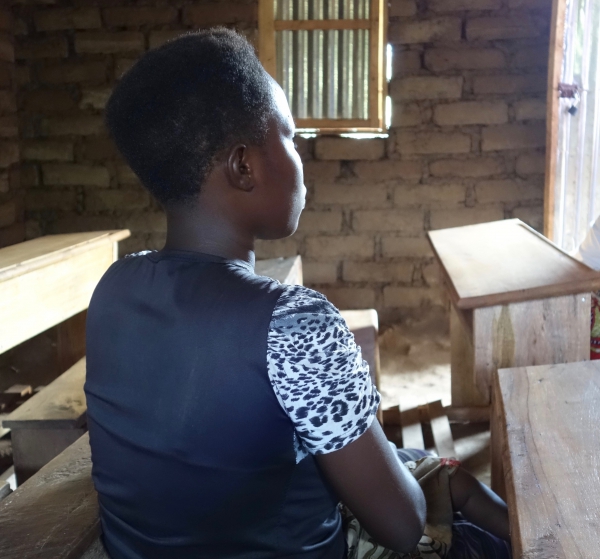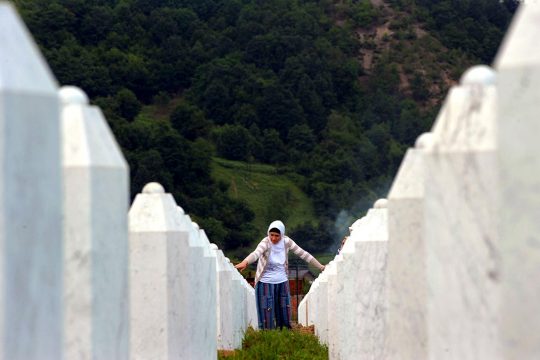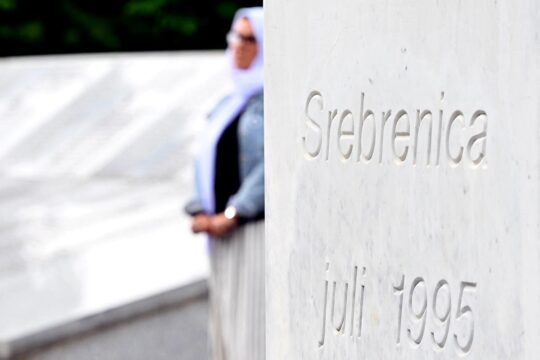The life sentence on Bosnian Serb military chief Ratko Mladic by the International Criminal Tribunal for former Yugoslavia (ICTY) was widely hailed as a victory for international law and justice. Mladic was found guilty of genocide in Srebrenica, crimes against humanity for ethnic cleansing of Bosnian towns and the siege Sarajevo, and war crimes for the hostage taking of UN personnel to stop NATO intervention during the war in Bosnia-Herzegovina 25 years ago. Only Serb nationalists and Russia criticized this judgment, which comes as the ICTY prepares to close.
The 1,800 pages of the judgment are also pages for history. “The judgment (…) relates dozens of dramatic events during the war in Bosnia-Herzegovina (1992-1995), in which over 100,000 people died,” writes our correspondent in The Hague Stéphanie Maupas, “survivors of which came to testify at the court during the four years of Ratko Mladic’s trial.”
The court also details the close links between Mladic and the authorities in Belgrade, including former Serbian president Slobodan Milosevic, who died in detention in 2006 before the end of his trial.
“Thanks to the ICTY’s investigations, we know with remarkable precision who did what to whom, where, how and with whom,” says Loïc Trégourès, a researcher at the University of Lille in France. He thinks that “judges and prosecutors have managed to give the ICTY credibility, as well as rules, objectives and ambitions”. But there is a shadow over the Tribunal’s legacy. Several acquittals of suspected war leaders handed down by the court remain highly controversial. Nevertheless, writes Trégourès, “this tribunal is a pioneer in the field of international justice. It proves that it is possible to try war criminals, including heads of State. It opened the way for the Rwanda Tribunal, the International Criminal Court (ICC) and the fact that today it is no longer a utopian dream to hope that war criminals, wherever they are, will be brought to justice”.
Reconciliation?
So has the ICTY also contributed to peace and reconciliation in the Balkans, which are still prey to ethnic and religious divisions? For example, while victims’ relatives in Bosnia-Herzegovina were hailing the verdict against Mladic, in Serbia there were some demonstrations supporting him.
In a long interview with JusticeInfo, ICTY Prosecutor Serge Brammetz recognized the limits of the Tribunal’s work. “Unfortunately we see among the new generations an attitude of hatred where we might have hoped that the current generation of politicians would say the opposite: never again, never another war,” he said. “On the contrary, people are trying to glorify the attitude of war criminals.” But he believes that “the situation would be even worse had the Tribunal not existed. Prosecuting the crimes is really a starting point to give reconciliation a chance”.
Reconciliation also remains a difficult issue in the Democratic Republic of Congo. Sandra Olsson of the NGO Child Soldiers International explained in an interview why many young girls captured by armed groups have difficulty leaving these militia and returning to their communities. “Many young girls do not even try to escape, even if there is an opportunity,” she says, “because they know that if they return home they will be rejected. And DDR (Disarmament, Demobilization and Reintegration) programmes do not tackle adequately this fundamental problem of family and community acceptance.”
According to Sandra Olsson, it is their communities that can help these young girls reintegrate. “A young girl will not make it unless her family and her community give her all the support and respect that she deserves, allowing her to overcome all the suffering and terror that she has experienced in the bush and to find her place again among her people.”







